Jan 2020
Jan 2020 vuyelwan
Translations
Jobs: The Department Of Justice And Constitutional Development-Jan 2020
Jobs: The Department Of Justice And Constitutional Development-Jan 2020 BathandwaDeputy Director-General: Corporate Services
Ref No:19/179/Hr
Centre: National Office: Pretoria
Salary: R1 521 591 – R1 714 074 per annum (All inclusive remuneration package). The successful candidate will be required to sign a performance agreement.
Requirements: A Bachelor’s Degree (NQF 7) and Post- Graduate Degree (NQF 8) in Management Science, Social Science, Business Administration/Management or Public Management/Administration; 8 years of experience at a senior management level; Extensive knowledge of the statutory framework that informs activities of the Department; Broad knowledge and understanding of Government policies.
Enquiries: Ms R Roos (012) 315 1159
Chief Master
Ref No: 19/176/Mas
Centre: National Office: Pretoria
Salary: R1 521 591 – R1 714 074 per annum (All Inclusive Remuneration Package). The Successful Candidate Will Be Required To Sign A Performance Agreement.
Requirements: An appropriate LLB Degree or recognized 4 year legal qualification (NQF level 8); 8 years of experience at a senior management level of which 5 years should be Management of Deseased estates, insolvencies & trusts; Knowledge of all spheres of law including interpretation of statutes, administrative law, law of contracts and asset forfeiture; Knowledge of PFMA and Treasury Regulations.
Enquiries: Mr. S Maeko Tel: (012) 315 1996
State Attorney: (07 Posts)
Ref No: 19/180/Sa: Pretoria (1)
Ref No: 19/181/Sa: Durban (1)
Ref No: 19/183/Sa: East London (1)
Ref No: 19/184/Sa: Bloemfontein (1)
Ref No: 19/185/Sa: Johannesburg (1)
Ref No: 19/186/Sa: Nelspruit (1)
Ref No: 19/182/Sa: Cape Town (1)
Salary: R1 251 183 – R1 495 056 per annum. The Successful Candidate Will Be Required To Sign A Performance Agreement.
Requirements: An LLB or Four year recognized legal qualification at NQF 7; 5 years’ experience at a senior managerial level; Minimum of 8 years litigation experience; Admission as an Attorney; Administrative and management experience.
Enquiries: Ms. K. Ngomani (012) 357 8661
Deputy Director Security Management
Ref No:19/127/Kzn
Centre: Regional Office, Durban
Salary: R733 257 – R863 748 per annum. The successful candidate will be required to sign a performance agreement.
Requirements: B Degree or a 3 year National Diploma in Public Administration or equivalent qualification; Minimum of three years middle management experience in Security Management; A valid driver’s licence.
Enquiries: Mr J.N. Mdaka (031) 372 3000
Deputy Director: Quality Assurance: (2 Posts)
Ref No:19/166/Cs
Centre: National Office: Pretoria
Salary: R733 257 – R863 748 per annum (All inclusive remuneration package). The successful candidate will be required to sign a performance agreement.
Requirements: A National Diploma/ Degree in Public Administration (NQF6) or equivalent qualification; Minimum of 3 years’ experience in administration of which 3 years will be in supervisory level; Knowledge of Public Service Regulation, Public Finance Management Act, Treasury Regulations and Labour Relations Act; A valid driver’s license; The following will serve as added advantages: Additional qualification in investigations; Knowledge and experience of Labour Relations.
Enquiries: Ms L Skosana (012) 315 1844
Court Manager (2 Posts)
Ref No: 44/19/Lmp
Centre: Magistrate Namakgale
Ref No: 161/19ec
Centre: Magistrate, Peddie
Salary: R470 040 – R553 677 Per Annum. The Successful Candidate Will Be Required To Sign A Performance Agreement.
Requirements: Three (3) year qualification in Administration (NQF level 6) and / or National Diploma in Services Management (NQF level 5) plus the module on Case Flow Management or equivalent qualification; At least 3 year’s managerial or supervisory experience; Knowledge and experience in office and district administration; Knowledge of Public Financial Management Act (PFMA); Experience in managing Trust (Third Party Funds) and Vote Account; A valid driver’s licence; Experience in the Court environment will be an added advantage;
Enquiries: Limpopo: Ms MP Mongalo. (015) 287 2037 or
Ms Mr Phalane (015) 287 2036
Eastern Cape: Mr. P Hattingh (043) 702 7000
Assistant Director: Cara and President Funds
Ref No:19/167/Cfo
Centre: National Office: Pretoria
Salary: R376 596 – R443 601 per annum. The Successful Candidate Will Be Required To Sign A Performance Agreement.
Requirements: A 3 year Degree/National Diploma in Finance Management or equivalent qualification (NQF 6); 3 years relevant experience in Finance at supervisory level; Knowledge of costing methodologies; Knowledge of Public Finance Management Act (PFMA), Prevention of Organised Crime Act (POCA), Promotion of National Unity and Reconciliation Act, Treasury Regulations, GRAP and Budgets; A valid driver’s licence.
Enquiries: Ms N Joseph (012) 357 8646
Registrar (Mr 1 – Mr 4)
Ref No: 57/19/Lmp
Centre: Magistrate Polokwane (Regional Court)
Salary: R198 411 – R351 795 per annum. (Salary will be determined in accordance with experience as per OSD determination). The successful candidate will be required to sign a performance agreement.
Requirements: LLB or four year recognized legal qualification; One year relevant legal experience required; A valid driver’s licence.
Enquiries: Mr V Lamola (015) 287 2035
Mr. TP Maakamedi. (015) 287 2025
Closing Date: 23 December 2019
Note: Interested applicants may visit the following website: www.justice.gov.za or www.dpsa.gov.za to view the full job specification of the above positions. Applications must be submitted on Form Z83, obtainable from any Public Service Department or on the internet at www.gov.za. A Z83 form & CV must be accompanied by original certified copies of qualifications, identity document and a driver’s licence where necessary. A SAQA evaluation report must accompany foreign qualifications. Applications that do not comply with the above mentioned requirements will not be considered. All shortlisted candidates for SMS posts will be subjected to a technical and competency assessment. Candidate will complete a financial disclosure form and also be required to undergo a security clearance. Foreigners or dual citizenship holder must provide the Police Clearance certificate from country of origin. The DOJ&CD is an equal opportunity employer. In the filling of vacant posts the objectives of section 195 (1) (i) of the Constitution of South Africa, 1996 (Act No: 108 of 1996), the Employment Equity imperatives as defined by the Employment Equity Act, 1998 (Act No: 55 of 1998) and relevant Human Resources policies of the Department will be taken into consideration. Reasonable accommodation shall be applied for People with Disabilities including where driver’s license is a requirement. Correspondence will be limited to short-listed candidates only. If you do not hear from us within 3 months of this advertisement, please accept that your application has been unsuccessful. The department reserves the right not to fill these positions. Women and people with disabilities are encouraged to apply and preference will be given to the EE Target.
Tel: 012 315 1111 Private Bag X81, Pretoria, 0001 Momentum Centre, 329 Pretorius Street, Pretoria www.justice.gov.za @DOJCD_ZA at DOJCD
A girl's mission to save the planet
A girl's mission to save the planet angenithaGrade 12 pupil’s scientific research project has earned her a full bursary to study at a South African university of her choice.
Gcinani Mazibuko (18), from Bethamoya High School in Madadeni near Newcastle, impressed judges at the Eskom Expo for Young Scientists with her Carbon Dioxide Limiter. The invention aims to reduce carbon dioxide by reacting it with potassium hydroxide (KOH).
KOH is used to manufacture some soft soaps and liquid soaps.
Mazibuko’s research shows how KOH has the potential to decrease carbon dioxide which is emitted when coal is burnt.
“Most industries these days use coal as fuel. Coal releases the most amount of carbon dioxide of all the fuels that are available,” Mazibuko explained.
She said the Carbon Dioxide Limiter works by reacting the carbon dioxide with KOH before releasing it into the atmosphere.
The project was inspired by a movie about penguins that live on ice and are affected by global warming.
The young scientist warned that if global warming is not halted, it will affect everyone because the scarcity of plants will have an impact on food which will affect the economy.
She said she conducted a number of experiments during her research project.
Mazibuko plans to study engineering at the University of the Witwatersrand. She hopes the knowledge gained at the institution will help her develop her research even further.
“The project I presented at the Eskom Expo for Young Scientists was at a basic level. I am hoping that in about two years’ time, when I have the right information and equipment, I can further my project so that it can be implemented by factories,” she said.
Bicycles give way for better mobility
Bicycles give way for better mobility angenithaPedal power propels Western Cape communities’ journey towards empowerment and success.
Over 1 500 people in rural communities in the Western Cape no longer have to walk long distances, thanks to the Bicycling Empowerment Network (BEN).
This non-profit organisation was started as a way of improving mobility for people living in areas where access to transport is difficult. Bicycles are safe and reliable, environmentally friendly, cheaper than public transport and promote a healthy lifestyle. 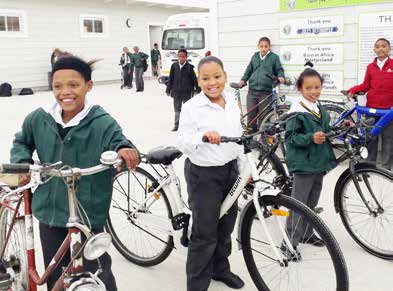
BEN has partnered with government and donor agencies to distribute thousands of bicycles to the people who need them most.
“BEN’s mission is providing access to opportunities through the use of a bicycle – giving hope and a step up to those who need it most,” explained BEN General Manager Tim Mosdell.
Bicycle recipients include schools, clubs, charities, farm workers and more.
Nathan Nelson from Zandvlei said having a bicycle has been very convenient for him, especially because he is involved in community work. Instead of having to walk for miles, or rely on expensive taxis, he now hops on his bicycle and heads off to his destination.
One of the most successful partnerships BEN has been involved in is the Bike4All programme, started in 2017, which has seen BEN, Pedal Power Association (PPA) and Qhubeka deliver over 1 150 bicycles to communities. To cater for younger riders, over 300 BMX bicycles have been distributed to children, along with helmets and safety bibs. The Cool Kid on a Bike programme is presented to groups to teach them safe cycling principles before the bicycles are handed over.
Bicycles are distributed through Bicycling Empowerment Centres which are managed by community members. This stimulates economic growth and job creation in rural areas.
“Community-based entrepreneurs have been trained in small business management and as bike mechanics. The establishment of the centres promotes employment creation while providing BEN with a good distribution network,” said Mosdell.
In November 2019, BEN, Qhubeka and PPA were chosen to lead the Western Cape Department of Transport and Public Works’ new bicycle distribution initiative. During the first year of the three-year programme, 400 bicycles will be distributed.
*To find out more about BEN, call 021 788 4174 or email info@benbikes.org.za.
Certified documents now expire after six months
Certified documents now expire after six months tsoanaAll government departments and its components have been directed to stop the practice of requiring certified copies of documents not older than three months to accompany applications for employment.
This decision follows complaints raised with President Cyril Ramaphosa on social media and through other channels about the requirements for compliance with public sector job applications.
Departments have been advised to at least accept certified copies of documents submitted with an application for employment that are up to six months old, in those cases where the document certified does not have an expiry date that falls within the six-month period, the Presidency said.
“Government has recognised that the practice to date impacts negatively on jobseekers in the current economic climate in South Africa, and that there is a need to reduce the burden on jobseekers to submit - with each separate job application - certified copies of supporting documents (such as academic qualifications, which are not older than three months),” The Presidency said in a statement.
The Presidency said this change would also reduce the workload that the certification of documents creates for the South African Police Service personnel, who will now be able to devote more time to their core function of ensuring that South Africans are and feel safe.SAnews.gov.za
Eat well to live well
Eat well to live well tsoanaEating properly helps to reduce the risk of physical health problems like heart disease and diabetes.
A balanced, adequate and varied diet can help a person live a long and healthy life.
This is according to Nutrition Co-ordinator Natasha Kassen from the Northern Tygerberg Substructure of the Western Cape Department of Health.
Kassen said: “A balanced meal includes food from each food group. There should be vegetables, starch, protein and healthy fats on your plate.” 
She said a balanced diet and portion control also help a person maintain their ideal body weight.
“Vitamins and minerals in the diet are vital to boost immunity and healthy development and to protect the human body against diseases, in particular non-communicable diseases such as obesity, diabetes, cardiovascular diseases, some types of cancer and skeletal conditions,” Kassen added.
Dr Tshepo Motsepe, the spouse of President Cyril Ramaphosa, said an estimated 3.61 million school children in South Africa are expected to be clinically obese by 2025.
Speaking at the 2019 Child Health Priorities Conference, she said factors such as the rising income levels in the working class, the adoption of Western-style eating habits and the rapid spread of consumerism contribute to the rise in obesity.
“The cheapest food is often the unhealthiest, and with limited disposable income and lack of access to nutritious food, often the easiest,” said Dr Motsepe.
Kassen said a good diet can be achieved through healthy meal plans that incorporate different food types.
To save on the budget for groceries, Kassen suggested buying fresh fruit and vegetables that are in season.
“Ready to eat cereals cost more than those you can cook like oats and maize meal. Make your own sandwiches instead of buying store-made sandwiches. Alternative proteins such as beans and eggs are more affordable than meat, chicken and fish,” added Kassen.
She said different nutrient types have different effects on the body. “Carbohydrates give energy, proteins help the body to grow and repair itself, dairy products keep our bones and teeth healthy while fruit and vegetables are full of vitamins, antioxidants and fibre,” she explained.
“Drink a lot of water. Use fats sparingly. Use sugar and foods and drinks high in sugar sparingly. Use salt and food high in salt sparingly,” she advised.
Empathy for teachers inspires teen’s chalk invention
Empathy for teachers inspires teen’s chalk invention JoyA primary school science experiment has earned a young girl national recognition and may herald some good news both for teachers and the environment.
A Grade Seven pupil of HP Ngwenya Public Primary School in Chesterville, Durban, has chalked up a win for teachers.
The young teen has created a chalk that emits minimal dust and is environmentally friendly.
Maluta Gcabashe (13) hit upon the idea after noticing how her teachers were often covered in chalk dust. “Most teachers get their hands dirty when they write on the board. Chalk dust is also not healthy to breathe in,” said Gcabashe.
She set about researching chalk production, reading scientific articles and watching videos she found online. “I learned the techniques online with my mentor but then applied my own additions to the concept,” she said.
Gcabashe has already created two chalks using Maizena, popularly known as corn flour, and eggshells.
Her first chalk was Maizena-based and was moulded in a toilet paper inner that she had made narrower. The second used eggshells, Maizena and water. “I took the eggs’ inner membrane and then ground it using a mortar and pestle. I ground it until it was a fine powder, before mixing it with Maizena,” she said.
Both mixtures were then left to set for 24 hours.
The invention got the nod from teachers at a neighbouring high school. “I took my chalk to teachers at Bonela Secondary School and asked them to try it out and they wrote recommendations saying they would use the chalk,” Gcabashe explained.
Gcabashe was also recognised at the Eskom Expo International Science Fair, where she was awarded the Best Development Project prize.
“The chalk needs to be produced locally using recycled and natural material. I hope it will become accepted by teachers as an alternative to both standard chalk and the kind of chalk one can buy that is dustless,” said Gcabashe.
The Siemens Grand Prize at the expo went to Pinky Jiyane from Ongoye Secondary School, also in KwaZulu-Natal, for her Ultra Smart Meter. The meter will allow people to remotely check their prepaid electricity balance and load more units, if needed.
Jiyane will receive a three-and-a-half-year international technical apprenticeship at Siemens in Berlin.
Farmer empowers workers
Farmer empowers workers angenithaGrowing fruit – and helping surrounding community – is the aim of a Western Cape family-owned farming business.
An award-winning farming enterprise is opening doors of opportunities for its employees.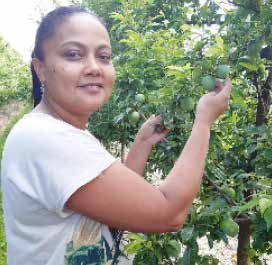
Based in Grabouw in the Western Cape, Nitaflo (Pty) Ltd, trading as Protea Farm, employs 23 permanent staff members, 12 of whom are young people, and 30 seasonal workers.
Farm owner Marilyn Siegel’s (43) passion to develop farmworkers started after seeing her father Edward van Niekerk, a former farmworker grow to owning his farm. She explained that her father was a farmworker who received skills training that helped him run the Protea Farm which has now been turned into a family business.
“Watching my father succeed from farmworker to farm owner motivated my decision to also empower my employees.” Siegels also said that her staff members participated in an irrigation training session hosted by the Department of Rural Development and Land Reform (DRDLR) and also underwent firefighting training.
At the beginning of 2019, one of the farm’s general workers indicated that he hoped to study further and not only was he assisted with his application, but Protea Farm also helped his adult daughter with her application.
Siegels and her family received the farm through a 30-year lease agreement in 2013 as part of the DRDLR’s Proactive Land Acquisition Strategy programme.
Siegels was also the 2019 Top Entrepreneur: Commercial in the Western Cape round of the Department of Agriculture, Forestry and Fisheries’ Female Entrepreneur Awards.
She said in 2019 they planted apples on an additional seven hectares of land and plums on 10 hectares of the 74.68-hectare farm. Protea’s plums and apples are packaged and exported to Europe and Thailand. The farm also supplies apples to Appletiser. Farming has not been without its challenges, said Siegels. In 2017, they lost over R2.5 million in the drought that hit the Western Cape, which prompted them to find alternative water supply sources. Today, the farm has two dams, a borehole, water rights from the Groenland Irrigation Board and access to water from the Kromme River.
Siegels said she hopes that her farm can play its part in developing the agriculture industry in the area. “We need to show people that agriculture is important. It can improve their lives,” she said.
GBV clampdown at tertiary institutions
GBV clampdown at tertiary institutions UrsulaThe Department of Higher Education is finalising the Policy Framework on Gender-Based Violence (GBV) in the Post-School Education and Training System. 
This is according to Minister Blade Nzimande, who said the policy framework is expected to be published by end of March 2020 for implementation.
The policy framework was developed following the appointment of a Ministerial Task Team to advise on matters relating to sexual harassment and GBV in public universities in South Africa.
The task team was appointed after an open letter written by a group of academics to the former minister of the department in March 2019. The letter highlighted issues of GBV, including sexual harassment.
Among the issues that were raised by academics were the tendency by lecturers, especially male lecturers, to ask for sexual favours from students in exchange for marks; and young female academics who are harassed by senior leadership in universities in exchange for job security.
Academics recommended, among other things, that a special investigation be conducted into the extent of sexual offences directed at both staff and students in the higher education sector; that a register of offenders be published on the department’s website for all higher education institutions to access before posts are offered to new staff members; and that a charter of ethics be established and signed by all staff and students who assume positions of leadership in higher education institutions.
Minister Nzimande said the task team will advise him on the implementation of the policy framework within the university sector, focusing on institutional policy alignment and initiatives to address GBV in universities.
“The department is also working closely with Universities South Africa to address urgent safety and security concerns on university campuses to ensure that students and staff in our universities are safe from all forms of violence,” he said.
Innibos National Craft competition calls for entries
Innibos National Craft competition calls for entries angenithaEntries are now open for the fourth Innibos National Craft Awards.
Launched in 2017, the competition last year attracted over 1 200 entries, up by over 400 entries from the inaugural competition.
The awards are organised by John-Anthony Boerma and Jan Bhuda of ArtAid Africa and are hosted under the auspices of the National Innibos Arts Festival.
From the get-go, the organisers were intent on creating a competition that was as inclusive as possible and four years later, this remains unchanged. Entry is thus free of charge and the entry process is simple – requiring only that a photo of the craft item be submitted, along with the entrant’s details.
“The competition is focused on showcasing the excellence of skill among South Africa’s crafters, from established artists with their own studios to those emerging craftsmen whose mastery is forged from nothing more than their own determination,” says John Anthony.
The overall winner walks away with R50 000, the first runner-up with R20 000 and the second runner-up with R15 000. Just as valuable as the prize money, however, are the connections forged with like-minded individuals and the exposure of their talent on a national stage.
The winners will be announced at the National Innibos Craft Awards Exhibition and Prize-giving on Sunday, 21 June 2020, at which all 40 shortlisted entries will be displayed.
The exhibition will remain open to members of the public for the duration of the annual Innibos National Arts Festival, which attracts over 100 000 visitors each year.
Entering is easy!
Crafters have until midnight on 1 May 2020, to enter.
- They need simply take a photo of their entry – next to a matchbox for size of scale, and either email it to crafts@innibos.co.za or send it to 071 621 3597 via MMS or WhatsApp. There is no entry fee.
- Remember to include your name, the town in which you live and your contact details.
- Entrants who have not heard from the organisers within 30 days of the closing date must accept that they did not make the shortlist for final judging.
- The finalists must be available to attend the exhibition opening and prize giving on 21 June 2020.
For more information WhatsApp Jan Bhuda on 071 621 3597 or email John Anthony Boerma at artaid@lantic.net.
Internship opens doors for beer brewer
Internship opens doors for beer brewer BathandwaBloemfontein’s Itumeleng Melesi (26) has good reason to raise a glass in a celebratory toast.
He has created his own craft beer, Rooted Premium Lager, and has dreams of seeing it become a name that rolls smoothly off the tongues of beer lovers.
As a young Bachelor of Agriculture in Crop Management graduate from the University of the Free State, Melesi received an internship through the then Department of Agriculture, Forestry and Fisheries.
Following the completion of his internship he opted to start his own beer brand.
The bright idea came while enjoying a beer. A period of intense research followed, with Melesi spending hours on Google and YouTube, reading everything he could on brewing beer.
He bought books and obtained basic equipment so he could begin experimenting with recipes. “It was a lot of trial and error but I finally hit the mark,” he said.
He went on to seek manufacturing and bottling facilities, and this is when the first Rooted Premium Lager hit the market.
Melesi plans to supply high-end restaurants with his Rooted Larger.
“My target is people who are not money conscious. It’s people who are willing to explore different tastes and are willing to pay for a premium product.”
Melesi credits his mother, Malehlohonolo, who made his dream a reality by giving him the R6000 capital he needed to get started.
“I have big plans for Rooted Premium Lager. I want it to be world renowned; it should be represented at world tasting sessions and be popular here at home. I want people to enjoy my product.”
Currently, the lager is only available in bottles, but Melesi plans to add tins to target festival-goers.
“I want the manufacturing of my lager to remain in Bloemfontein to help create jobs for locals and help put the city on the map,” he said.
Moms trained to improve ECD in communities
Moms trained to improve ECD in communities tsoanaEastern Cape communities are learning that children who receive stimulation and sensory education before they start primary school are more likely to succeed in life.
Parents should not think they cannot improve the quality of the education their child receives before primary school.
This is the philosophy of an innovative programme run by the Cookhouse Wind Farm in the Eastern Cape. The programme teaches mothers from disadvantaged backgrounds to become more involved in early childhood development (ECD) in their communities.
The Mentor Moms programme focuses on training mothers about the essential aspects of ECD and how they can ensure that children are receiving a good education at ECD centres.
In 2016, the wind farm called in non-profit organisation Siyawela – which runs a programme called Bringing Parents to the Education Table – to assist with improving ECD in the four communities around the wind farm.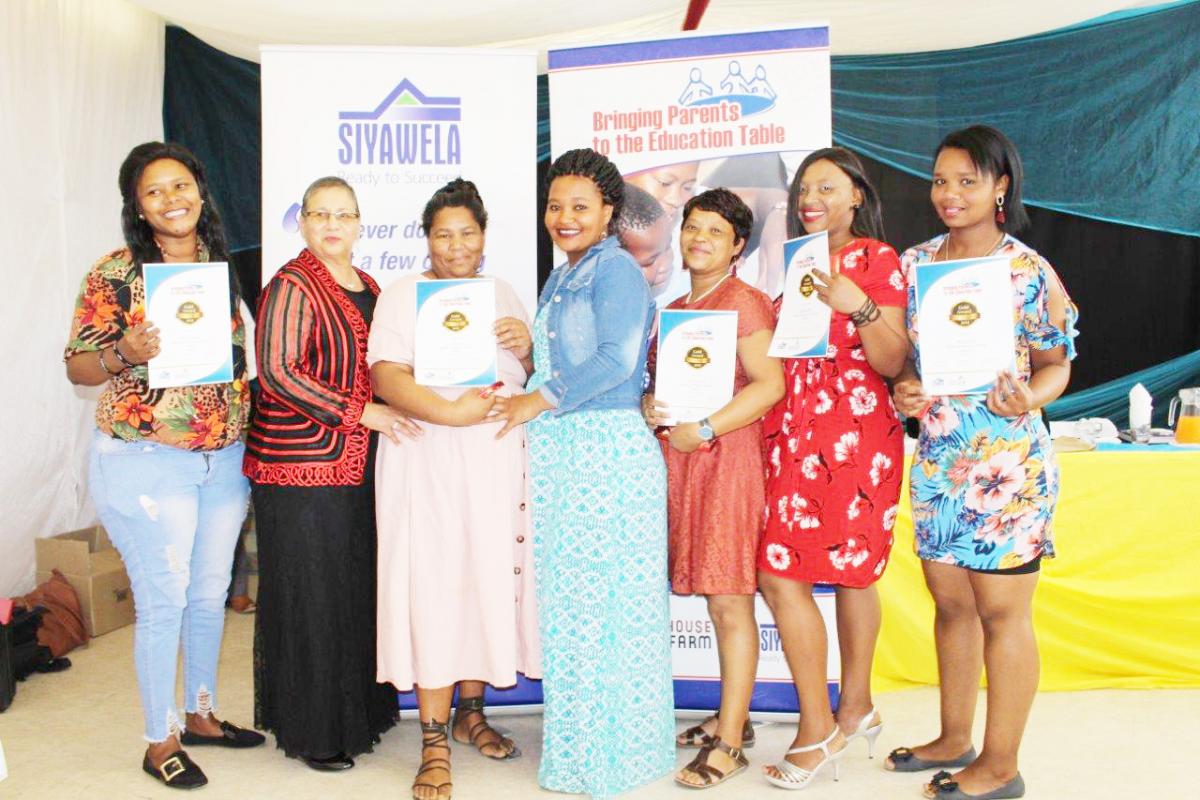
“This programme gives parents the knowledge they need to help children with early learning such as counting, shapes, reading, colouring-in and so forth. We wanted to increase the interaction between parents and children so that when children come home from school, parents can tell whether they are being taught the right things and are receiving a good quality education. Children need to have all the basic skills in place so that they can be prepared for primary school,” said Cookhouse Wind Farm’s Community Operations Manager, Elton Gordon.
A total of 533 parents went through the Siyawela programme, each receiving a certificate.
After graduation, the wind farm selected 24 Mentor Moms who could then take the skills they had learnt into their communities.
One of the Mentor Moms, Kelly Lourens, said before the programme, parents in her community were not aware of how important ECD is.
“Parents would just take their kids to an ECD centre, without really worrying about what they were doing there. Through the programme, we have all learnt that this stage of a child’s life is extremely important,” said Lourens, herself a mother of a four-year-old.
Each Mentor Mom has between five and seven parents who they provide mentorship to. The Mentor Moms give workshops to these other parents, and they also have monitoring sessions where they go into the household to see whether the parents are using the skills that have been taught to them.
New pill set to strengthen the fight against HIV
New pill set to strengthen the fight against HIV UrsulaThe Department of Health has introduced a new and more effective medication which is set to have a far-reaching impact on the fight against HIV. 
A simple, more affordable and effective HIV medication was recently launched in South Africa by Minister of Health Zweli Mkhize and will be rolled-out across the country.
The new medication, known as TLD, is a three-in-one, fixed-dose combination that includes dolutegravir, lamivudine and tenofovir. It works by suppressing the viral load, which is the number of HIV particles in a person’s bloodstream.
According to the Department of Health, the mediation has fewer side effects for people living with HIV. TLD can be used by anyone, regardless of their age, gender, race, CD4 cell count and clinical stage. The pill is small and easy-to-swallow.
“It is the best medicine that is used anywhere in the world and we are very pleased to be able to provide it to our patients. The new medication has fewer side effects, is more tolerable and decreases the viral load more rapidly,” said Mkhize at the launch, held in the Ugu district on KwaZulu-Natal’s south coast, which has one of the highest HIV infection rates in South Africa.
Ugu has attained the United Nations AIDS-set 90-90-90 target, which specifies that by 2020, 90 percent of all people living with HIV will know their HIV status; 90 percent of people diagnosed with HIV infection will be on treatment and 90 percent of people receiving antiretroviral therapy will have viral suppression.
“This is a huge achievement in a district and province with the highest rate of HIV in the country,” Mkhize said.
The pill’s known side effects include nausea, insomnia or occasional dizziness, but these are mild and manageable.
When children become mothers
Another health concern highlighted by the Minister at the launch was teenage pregnancies. “We have too many unwanted and unintended pregnancies in our country as well as too many teenage pregnancies.”
He said in the Ugu district alone, 66 girls between the ages of 10 and 14 and 2 436 between the ages of 15 and 19 gave birth in 2018.
“We need to attend to this urgently as children should be children and not parents,” he said.
Njenga’s farming business ready to prosper!
Njenga’s farming business ready to prosper! BathandwaKhutso Njenga (27) only started farming in 2018, when he joined his uncle’s business TechFarma. But just over a year later, the passionate young farmer is already a finalist in the South African Breweries (SAB) Urban Agriculture programme.
Njenga, from Soshanguve in Tshwane, runs a 24-hectare farm where he and his team grow cucumbers, peppers and tomatoes in greenhouse tunnels. He said when he decided to join his uncle in the world of farming, he immediately fell in love.
Recently, Njenga and his team harvested 3 750 cucumbers and delivered them to the Fresh Produce Market in Tshwane.
“I became a farmer to create jobs for others and to make sure people have access to fresh, nutritious and affordable vegetables,” Njenga said.
Njenga’s passion paid off when he was announced as one of the nine finalists of the SAB Urban Agriculture programme. The initiative is part of SAB’s flagship youth entrepreneurship programme, SAB Kickstart, which invests in youth businesses.
Njenga and the other finalists first went through a ‘boot camp’ which provided skills training, fieldwork and site visits, led by experts in agriculture. The finalists will also complete a 15-month business development programme which provides technical and operational training, hydroponic infrastructure investment, mentorship and access to markets.
“I am extremely thankful for this wonderful opportunity. It is not every farmer who gets to be given such valuable assistance,” said Njenga.
Phumzile Chifunyise, SAB Enterprise Development Manager, said the Urban Agriculture programme looks to remove the barriers of entry into the agriculture field for young farmers.
“Our intention is to attract young people to the sector by alleviating the high barriers to entry such as technical and operational resources.”
Chifunyise said hydroponic technology – the process of growing plants with added nutrients but without soil – is a highly useful way for farmers to grow their businesses. “We are growing the presence of young farmers through the application of hydroponic technology to scale their business and link them to markets.”
The business development programme will be carried out with the help of training organisation Made with Rural, which has designed an agribusiness development programme.
If you are an emerging farmer or entrepreneur looking for business support, call SAB Entrepreneurship toll free at 0800 611 095.
Phumla ngonaphakade Kumkani. Aa! Zwelonke
Phumla ngonaphakade Kumkani. Aa! Zwelonke BathandwaPresident Cyril Ramaphosa says the passing of His Majesty King Zwelonke Sigcawu is a reminder to people to use time wisely in performing good deeds and being of service to others.
“His Majesty’s passing is a reminder of the shortness of our life on this earth,” President Ramaphosa said.
 Speaking at the funeral service of the late AmaXhosa King Zwelonke Sigcawu, held in Willovale, Ngadu, in the Eastern Cape, President Ramaphosa said as a nation, the country has lost a leader who was a pillar of the community and a solid partner of government.
Speaking at the funeral service of the late AmaXhosa King Zwelonke Sigcawu, held in Willovale, Ngadu, in the Eastern Cape, President Ramaphosa said as a nation, the country has lost a leader who was a pillar of the community and a solid partner of government.
“We are saddened, but we know that no matter how much we wish to, we cannot hold back the hand of fate. It was His Majesty’s time to leave us,” President Ramaphosa said.
He said the late King has left behind a legacy of visionary leadership that lives on.
“He may have passed on to the next life, but the example he set on the meaning of leadership, on advancing social cohesion, and on service to one’s fellow man and women, will be imparted beyond his brief time on earth,” he said.
President Ramaphosa described the late King as a leader whose impact and influence extended beyond the country’s borders.
“The tributes that have poured in from Botswana, eSwatini, Lesotho, Zimbabwe, Uganda, Palestine, Venezuela and many other countries are proof of how he was not only recognised but revered by others beyond our country.
“We are immensely comforted by the condolences and messages of support. Such gestures of solidarity go a long way in affirming our oneness as Africans,” the President said.
King Zwelonke Sigcawu’s coronation took place in 2015 at Nqadu Great Place.
His Majesty became King of AmaXhosa in 2006 and led his people until his passing on 14 November 2019.
The King died after a short illness at the age of 51.
He was also the first King in South Africa to be crowned in 2015 after the democratic recognition of traditional leadership.
The King’s funeral featured military ceremonial elements in accordance with the Category 1 status of this occasion.
President Ramaphosa ordered that the National Flag fly at half-mast throughout the country from 25 November 2019 until the evening of 29 November 2019.
Meanwhile, Nkosi Dumehleli Mapasa has been named acting King of AmaXhosa.
Mapasa, who is in his early 80s, will hold the fort until the process of installing a new king begins.SAnews.gov.za
R25 billion for Waterberg development
R25 billion for Waterberg development UrsulaPresident Cyril Ramaphosa has announced R25 billion for infrastructure projects in the Waterberg District Municipality in Limpopo. 
The projects are expected to, among other things, address issues of severe water shortages in the district which is made up of the Bela-Bela, Lephalale, Modimolle-Mookgophong, Mogalakwena and Thabazimbi local municipalities.
Addressing residents at the Shongoane Sports Ground in Lephalale recently, the President said government would in the next five years complete the Moloko Water Resource Project.
During the period, government would also pursue the Waterberg rail-line and build several much-needed schools in various communities in the district.
“We know that the people of this district are confronted with severe unemployment and poverty. We know about the problems of water, electricity, sanitation and roads. We know about access to land,” he said.
Government, he said, was also aware of the poor telecommunications network that frustrates economic development in the area.
“We need to attract investment in the area. We recently held the second SA Investment Conference and we raised R363 billion from private investment,” he said.
A portion of that money was to be invested in the mining district.
“Government will invest R25 billion over the next five years, and that’s a lot of money. Some companies will in this period implement 74 projects worth R580 billion in infrastructure and enterprise development projects,” said the President.
The investment should be able to help government intensify its mission to assist small businesses, especially those headed by the youth and women.
“We have to work together as the community, business and various organisations. We are committed to creating jobs. We want to build schools and TVET colleges to address the issue of education,” said President Ramaphosa.
High levels of unemployment
He decried the heightened levels of poverty and unemployment in Waterberg.
“A lot of people here don’t work. A lot of people in this district are poor and rely on social grants. If it were not for social grants, a lot of people would be hungry. That’s the profile we saw,” he said.
This was among some of the issues the District Development Model seeks to address. “It is to make sure that says there is one plan for one district with a set budget. National government will know how much is needed, for example, in Waterberg,” said the President.
With the model already being piloted in the OR Tambo District, eThekwini Metro and now the Waterberg District, government will in time assess the programme before rolling it out to the rest of the country.
The District Development Model has been approved by government structures, including Cabinet, to integrate service delivery that will be more practical, achievable, implementable, measurable and clearly aligned to the key priorities of government.
The model seeks to change the face of rural and urban landscapes by ensuring complementarity between urban and rural development, with a deliberate emphasis on local economic development. It is about putting local government at the centre of the country’s growth and development.
President Ramaphosa said it was encouraging that the model had received support from all sectors of society, including traditional and business leaders.
In meetings with traditional leaders and businesses in the area, the President said, made it apparent that the water shortages was what required the most urgent attention.
The stakeholders also said they wanted a clinic, a university and to see services and development brought closer to them.
“This can only be done if we work together as business, government [and] traditional leaders. Waterberg has great potential. We can focus on mining, yes, but we must also focus on agriculture and tourism,” he said.
“Waterberg is one of the most scenic areas in the country and we want to take advantage of that.”
He added: “Every project will be known by the people so that we can all be held accountable. There will be monitoring... those who do not perform, those who want to steal, will be shown the door. We must implement. It’s a model that says: ‘we must work’.”
The President was hopeful that this approach would lead to a reduction in service delivery protests.
“They won’t happen if people know government’s plans so there won’t be a need to vandalise infrastructure.” - SAnews.gov.za
Rope skipper masters speed and stunts
Rope skipper masters speed and stunts BathandwaWhen Mkhululi Gosa (20) of Khayelitsha in the Western Cape was just seven years old, he used to play with his peers at a community hall. One day he saw a group of guys practising rope skipping outside the hall and was intrigued.
He was invited to join in and today he is a world champion of the little-known sporting code.
“I was just amazed to see what they were doing. Luckily, one of the guys who was part of that team lived in the same street as me. He was excellent at flipping. When he noticed that I was watching them practice, he invited me to go to the gym with him on Tuesdays and Wednesdays because those were the days for them to practice. He knew I was good at flipping as well. I accepted and have not looked back since,” he said.
In October 2019, Gosa was part of the awesome foursome men’s team of the South African Gymnastics Federation (SAGF) which emerged victorious at the international Rope Skipping China Open.
Gosa and team members Tshilwane Sonopo from the Free State and Malusi Tumtumana and Buyilise Hubela from the Western Cape won eight medals and three trophies.
Gosa won gold for triple-unders. Sonopo won the silver trophy for 4800 Jump for the Heart section. Goza, Tumtumana and Hubela won the bronze medal for the Double Dutch three competition and the team won the bronze medal and trophy for the overall team award.
"This was the highlight of my rope skipping career because I travelled overseas for the first time and that has always been my lifelong dream,” said Goza.
It was the second time that he competed on an international stage. In July 2019, he and his three team-mates competed in Norway.
“These boys have honed their skills through sheer hard work, discipline and commitment. They are living proof that anyone can rise above their circumstances. They have been ambassadors for their communities, the SAGF and South Africa as a whole,” said SAGF Acting President Donovan Jurgens
Sappi heeds calls to help grow
Sappi heeds calls to help grow tsoanaSA Investment Conference
The giant Sappi Saiccor Mill in Mkhomazi, KwaZulu-Natal, one of the biggest of its kind in the world is providing a welcome boost for job creation in its surrounding local communities.
Sappi made it clear that South Africa is still a good place to do business at the second South African Investment Conference held in November last year.
Sappi Limited, is a leading global producer of dissolving wood pulp, packaging papers, printing and writing papers and biomaterials. 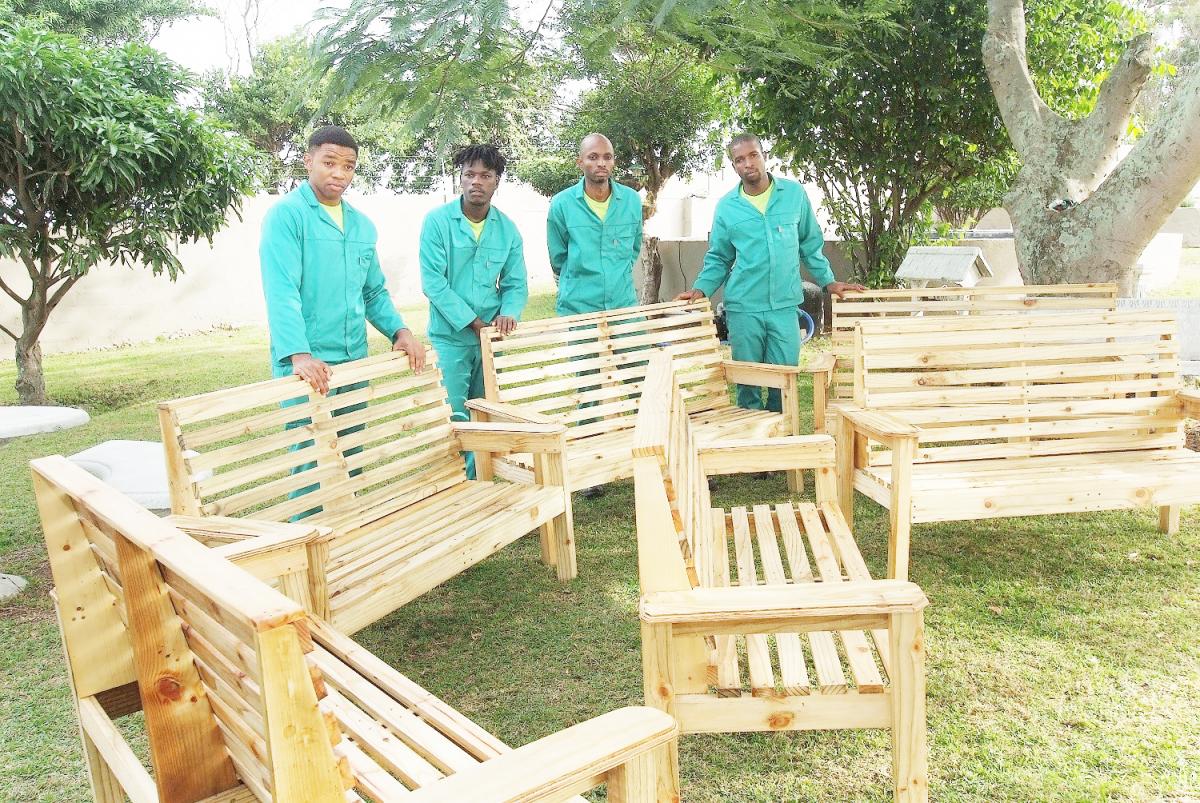
At this year’s investment conference, the company committed a R14 billion investment on its various plants across the country. The funds will be spent over a five-year-period on maintenance, expanding capacity, investing in new products and improving the company’s environmental footprint.
Mpho Lethoko, General Manager Communications, Sappi Southern Africa, said as part of the company’s investment in the country, the mill’s production capacity is being increased in a R2.7 billion capacity expansion project – known as Vulindlela.
“A further R5 billion will be spent over the next five years through maintenance and upgrade projects to decrease production costs, introduce new technology, optimise processes and future-proof manufacturing systems,” she said.
While permanent employees are being recruited to operate the new expansion, Lethoko said that to date some 1 035 workers were employed during the construction phase. Of these, 667 are from local communities.
Changing the lives of young people
Training for these contract workers took place at the nearby Sappi Skills Centre and at the Vulindlela training and onboarding facility.
“Since the opening of the Sappi Skills Centre on 1 February 2018, the lives of many young people in communities near the Sappi Saiccor Mill have changed for the better. This includes not just those who were seeking employment for the expansion project, but also some 160 youngsters who have been trained in various programmes aimed at empowering them to be self-sufficient,” said Lethoko.
One such young man is Sphesihle Ngcobo (22) from Danganya, a community near the Saiccor mill. He was accepted into the skills centre for training and completed a plumbing course. Along the way he also learnt life skills and business essentials.
“I have always loved working with my hands, and plumbing is like a puzzle, with all the pieces fitting together, and because I can use my hands, I really enjoy it,” said Ngcobo.
“When I was called for an interview at the mill, I was very nervous, but I would not have been able to get this opportunity of a job, if it wasn’t for the Sappi Skills Centre. I learnt a lot and I am very grateful,” he said.
Lethako added that Ngcobo couldn’t contain his excitement when he received a call from Sappi Saiccor to go for an interview.
“He is now employed as a pulp marker at the mill and has resolved to use his plumbing skills in part-time work, which he will offer free of charge to neighbours,” Lethoko said.
She added that young people have benefited from Sappi’s vision to empower youth with the necessary skills to enable them to create their own businesses or to seek meaningful employment.
“So far, this training has enabled seven of the young people from the local community to be accepted for the apprentice programme in mechanical and electrical engineering at the mill and 11 to find permanent employment in the mill,” she said.
Lethoko said a further six pre-apprentice candidates and six potential candidates joined a programme formed as a partnership between Sappi and the eThekwini Municipality. Thirty-four others are now running their own businesses, while others have found learnership or employment opportunities elsewhere.
“The training that Sappi offered at the centre has not just equipped them with new skills, but it has also enabled the young people to find a purpose and the inspiration and drive to succeed,” said Lethoko.
Saving water is a priority for all
Saving water is a priority for all UrsulaUnion Buildings
During my visit to Waterberg recently to launch the District Development Model, I spent time talking to people in the villages around Lephalale, at the Medupi power station and to business people in the town.
They all raised access to water as a serious issue: to sustain their lives and support agriculture in villages, to drive business, and to supply the world’s fourth largest coal-fired power station.
South Africa is a severely water stressed country. We do not have mighty rivers that flow all season like in other parts of Africa and the world.
In fact, with an average annual rainfall of 500mm compared to a global average of 860mm, we are the world’s 30th driest country.
A decade-long drought has put immense pressure on our water systems and has had a devastating impact on agriculture and communities, especially in the Eastern Cape, Northern Cape, Western Cape, Free State and Mpumalanga.
Dam levels are currently on average around 58 percent, compared to 69 percent for the same time last year.
Our existing water systems are already over-exploited as usage increases rapidly due to population growth and as more homes get connected to water. Combine this with the worsening effects of climate change and we are clearly facing a dire situation.
Unless we take drastic measures to conserve water sources and promote efficient use, water insecurity will become the biggest developmental and economic challenge facing this country. Our current energy challenges will seem small by comparison.
Although we have made substantial progress in providing water to our citizens over the past 25 years, access to water and deteriorating water quality continues to fuel service delivery protests.
We must improve access to water for communities, upgrade water infrastructure, and manage water more carefully, or face social unrest.
Water security isn’t just integral to ensuring the well-being of our people, it is critical to our economy, and to our goal to accelerate industrialisation and expand mining and agriculture.
During our visit to Lephalale business and industry representatives repeated what has become a familiar refrain, that economic development is being held back by drought, poor water infrastructure and delays in obtaining water use licenses.
As part of our efforts to remove bureaucratic barriers to economic growth we have directed that the water permit office should reduce the waiting time for water licenses, and significant progress has been made. The waiting period has been reduced quite dramatically.
The National Disaster Management Centre is coordinating measures to alleviate the impact of the drought. Relief projects, like emergency borehole drilling and water tankers, are in place in affected areas, and demand is being managed through water restrictions and rationing.
Municipalities are also installing bulk meters at reservoirs, repairing leaks and burst pipes, throttling water outlets at night to replenish reservoir supplies, and upgrading existing water treatment works. Successful public employment programmes such as Working for Water, which eradicates alien invasive plants, and Working on Fire are being scaled up.
Earlier this year, government provided R260 million in response to the drought. We have offered support to farmers to purchase fodder, reticulate water for livestock and for dam desilting.
Given the severity of the crisis, this amount is woefully inadequate. Disaster Management is working with provinces and municipalities to see how they can reprioritise their budgets for relief and recovery.
In the long term, especially if the drought persists, we will also have to research technologies such as evaporation suppression, fog harvesting and cloud seeding.
The country’s water infrastructure build is ongoing, as highlighted in the Water and Sanitation Master Plan released last week.
To ensure our future water security, we will need funding of at least R126 billion for infrastructure. With existing freshwater supplies dwindling, we will be focusing on projects that broaden our water resource mix. For example, Phase 1 of the uMkhomazi Water Project will prioritise the re-use of effluent, and projects like the Groot Letaba Water Augmentation Project in Limpopo and the Mzimvubu Water Project in the Eastern Cape will develop groundwater sources.
Mismanagement of water resources and corruption in the water sector has in no small part contributed to the situation we currently face.
Serious accountability and governance issues persist, whether it is in the building of infrastructure or at a municipal level, where water losses are mounting as a result of billing errors, unauthorised usage and outright theft.
Recently, the Special Investigating Unit raided Lepelle Northern Water in connection with alleged corruption at the Giyani Water Project. The amount allegedly involved – R2 billion – is staggering, but unfortunately symptomatic of widescale tender corruption in these mega projects.
This is putting the entire nation’s water security at risk, and the ongoing SIU probes into irregularities in these projects will continue. As will the work of the Hawks’ National Clean Audit Task team probing municipalities, where corruption in the provision of tankering services has frequently been alleged. Accountability will be enforced as part of restoring integrity to the sector.
Water conservation is everyone’s responsibility, and I call on all South Africans to play their part.
Domestic users must use water more sparingly and reduce their consumption.
Municipalities must invest in water recycling technologies that save both water and money. Industrial users must implement measures towards water use efficiency.
We must manage our water sources wisely to meet the basic needs of communities and industry, as we drive social transformation so that we can achieve the South Africa we want.
If we fail to do so we could soon find ourselves worse off than Samuel Taylor Coleridge’s Ancient Mariner, who wailed: “Water, water everywhere, nor any drop to drink.”
Unless we act now, we may not have water anywhere.
Second chance for 2019 Grade 12 learners
Second chance for 2019 Grade 12 learners angenithaLearners who did not pass matric in 2019 should not lose hope because they will be given a chance to rewrite subjects.
The Department of Basic Education’s Second Chance Matric Support Programme provides support to learners who did not meet the requirements of the National Senior Certificate (NSC) or the Senior Certificate (amended).
“We would encourage all learners who have not passed to take advantage of this important opportunity to not only achieve their certificate, but improve on their marks to open up new opportunities,” Basic Education Minister Angie Motshekga said.
The department has collated multimedia material to help these learners prepare for the NSC or the Senior Certificate (amended) examinations.
The material is made up of videos, study guides and audio clips. However, the department said it does not cover the entire curriculum, but instead focuses on core content of each knowledge area and points out where learners can earn marks.
To ensure a high quality pass, learners are encouraged to also cover the remaining aspects of the curriculum using other textbooks.
Other support offerings
Face-to-face classes-these classes are offered nationally at 50 venues, mainly in rural and semi-rural areas, by Grade 12 teachers with an excellent track record.
Multimedia broadcasting solutions – the department also encourages learners to make use of the HD Open View Television Broadcasts on Channel 201 at 36 venues nationally, or privately (more than 420 000 households are connected). Learners who have access to DStv are encouraged to watch Channel 319 for extra lessons; or SABC Education Geleza Nathi broadcasts weekdays on SABC 1 from 5am to 6am, with repeats at 11pm; and those with internet access should watch the SABC Education Geleza Nathi YouTube videos.
Internet access sites-for internet access, the department said learners can visit Vodacom ICT Centres and Thusong Service Centres across the country.
Online learning links – learners can also make use of Vodacom e-School as well as the Western Cape Education Department ePortal.
Candidates can register for the Second Chance Matric Support Programme by visiting the department’s website www.education.gov.za or by going to their nearest district education office. For enquiries regarding this programme, contact the department’s call centre at 0800 202 933.
Smart glove bridges communication gap
Smart glove bridges communication gap angenithaA new technologically advanced glove will help bridge the communication gap between people living with hearing impairments and those with full speech and hearing.
The CommuniCare Glove Sensor translates sign language into audio speech. 
The developer of the glove and CEO of Rudzambilu Holdings, Lucky Netshidzati (26), from Nzhelele in Limpopo, said the glove helps people living with hearing impairments by translating sign into audio and audio speech into an animated sign language. These translations can be viewed on a cellphone app.
The glove is compatible with all 11 official languages of South Africa. “We want a gogo in Limpopo who does not understand English to be able to use it,” Netshidzati said.
The glove will allow deaf people to engage with doctors, bank officials, police or other people in a manner that guarantees their privacy as there will be no need for a third party translator, he explained.
“Essentially, it’s about privacy and independence for the deaf community,” he said.
“The glove will also help curb the high student dropout rate as students and teachers will be able to communicate better. Currently in South Africa, especially in rural areas, we have a lot of deaf people who don’t study because it’s difficult to communicate with teachers,” said Netshidzati.
The glove was inspired by Netshidzati’s own struggles as the child of deaf parents. He explained that as a child, he had to live with his grandmother as he was unable to communicate with his parents.
"The device has been tried by my parents who are elated because they finally can communicate easily with me," said Netshidzati.
Research into the glove started in 2015 and the first functional glove was produced in 2018.
Working with the Tshwane Municipality’s Disability Unit, the invention was tested by members of the deaf society who Netshidzati said welcomed the glove with excitement.
The glove has also helped Rudzambilu Holdings, which was established to develop telecom systems for persons with disabilities, create employment for 10 young people.
Netshidzati hopes that his invention will act as a launch pad for future innovations to help people living with disabilities.
Teacher goes beyond call of duty for her pupils
Teacher goes beyond call of duty for her pupils tsoana Teacher’s commitment to excellence and the improvement of her pupils has been rewarded by the Gauteng Department of Education.
Teacher’s commitment to excellence and the improvement of her pupils has been rewarded by the Gauteng Department of Education.
Salome Mofokeng (27), a teacher at Lebohang Secondary School in Boipatong, won the Excellence in Secondary School Teaching category of the provincial National Teaching Awards.
Mofokeng is the school’s Head of Department for Accounting, Business Economics and Economic Management Sciences (EMS).
She is also the Teacher Liaison Officer responsible for Information and Communications Technology (ICT) and Concert and Prize-giving Coordination. In addition, she oversees the Learner Representative Council; Integrated Quality Management System and Induction Programme.
In her capacity as the ICT coordinator, Mofokeng teaches her colleagues and pupils how to use the school’s computer lab. She also uses the lab to assist Grade 12 pupils to apply for admission to higher education institutions, for jobs and bursaries.
“I help my pupils with applications because some of them come from poor families and don’t have access to resources,” Mofokeng said.
In addition to these responsibilities, Mofokeng also started the school’s art programme, which includes different types of dance.
Mofokeng said her passion for teaching was developed in high school. She loved teaching her peers, which was noticed by her accounting teacher who inspired her to follow a career in education.
“I try to relate to my learners. In my years of teaching, I have never taken any child to the principal. I always try to relate to them but also make sure that they know I am an elder,” said Mofokeng.
She teaches EMS to Grade Eight and Nine learners, and accounting to grades 10 to 12. One of Mofokeng’s favourite teaching techniques is to incorporate song into lessons. “I take content that is very difficult and turn it into rhythms so that they can remember it,” she explains.
Currently doing her PhD in Education Management at the North West University, Mofokeng said teachers should keep abreast of all developments in the field.
Mofokeng said her methods have resulted in a marked improvement in her pupils’ pass marks and the quality of passes.
Teen invents dust-free chalk
Teen invents dust-free chalk angenithaA primary school science experiment has earned a young girl national recognition and may herald some good news both for teachers and the environment.
A Grade Seven pupil of HP Ngwenya Public Primary School in Chesterville, Durban, has chalked up a win for teachers.
The young teen has created a chalk that emits minimal dust and is environmentally friendly.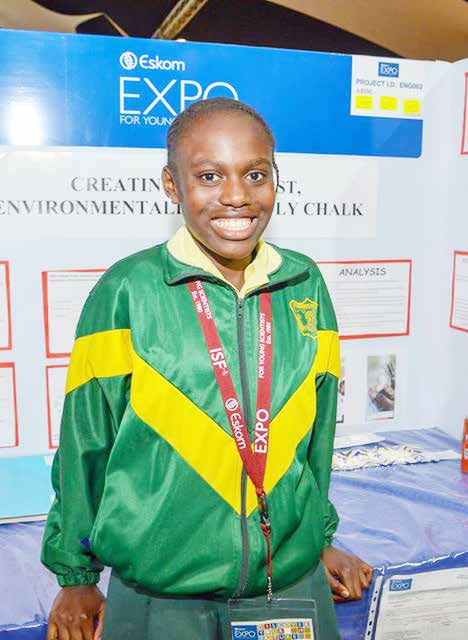
Maluta Gcabashe (13) hit upon the idea after noticing how her teachers were often covered in chalk dust. “Most teachers get their hands dirty when they write on the board. Chalk dust is also not healthy to breathe in,” said Gcabashe.
She set about researching chalk production, reading scientific articles and watching videos she found online. “I learned the techniques online with my mentor but then applied my own additions to the concept,” she said.
Gcabashe has already created two chalks using Maizena, popularly known as corn flour, and eggshells.
Her first chalk was Maizena-based and was moulded in a toilet paper inner that she had made narrower. The second used eggshells, Maizena and water. “I took the eggs’ inner membrane and then grounded it. I grounded it until it was a fine powder, before mixing it with Maizena,” she said.
Both mixtures were then left to set for 24 hours.
The invention got the nod from teachers at a neighbouring high school. “I took my chalk to teachers at Bonela Secondary School and asked them to try it out and they wrote recommendations saying they would use the chalk,” Gcabashe explained.
She was also recognised at the Eskom Expo International Science Fair, where she was awarded the Best Development Project prize.
“The chalk needs to be produced locally using recycled and natural material. I hope it will become accepted by teachers as an alternative to both standard chalk and the kind of chalk one can buy that is dustless,” said Gcabashe.
The legal end to a marriage
The legal end to a marriage JoyWhen you’ve tried everything to make your marriage work, a divorce may be the best option for both you and your partner. Divorce is difficult and stressful for families, and the legal process can be confusing.
A divorce is when a marriage is officially ended in a court of law. There are two types of divorce: unopposed – where both parties are in agreement that a divorce should take place; and opposed – where the parties do not agree on a divorce or its terms.
Josephine Peta, Senior Legal Admin Officer at the Department of Justice and Constitutional Development’s Office of the Family Advocate, explains that the divorce process starts when a summons is issued.
“A person who wants to have their marriage dissolved can get a divorce summons at a high or regional court, or they can approach an attorney to assist with the process. The spouse who starts the divorce proceedings is referred to as the plaintiff and the other spouse is the defendant,” said Peta.
Peta explained that the divorce summons must:
state that there is no reasonable chance of restoring the relationship,
make provision for the division of joint belongings or the enforcement of the terms agreed upon in the antenuptial agreement signed at the beginning of the marriage, and
set out what arrangements will be made for the couple’s children, such as who the child will live with.
“The summons must also state that the defendant has 10 days – in the case where he or she lives in the same area as the plaintiff, or 20 days – if the parties reside in different provinces, to answer the summons,” Peta added.
Once a case has been opened, documents are handed back to the plaintiff, who has to deliver two sets of these documents to the sheriff in the area where the defendant works or lives.
“The sheriff will then serve the documents personally on the defendant and issue a return of service, proving that the documents were served. Where there are children involved, the Office of the Family Advocate must be informed,” Peta pointed out.
After a period of 10 or 20 days, the plaintiff may enrol the divorce on the court roll. In contested divorces, the defendant must answer the summons by notice of intention to defend the matter.
“Once that is done, he or she must also file a plea within a specific period. A plea is a statement in which the defendant responds to the allegations in the summons.
After a plea is filed, the plaintiff can also reply to the plea or file a notice of set down.
“The matter will then be enrolled for trial,” Peta concluded.
What is a default divorce?
A court will grant a divorce by default if a summons has been served on the spouse and he or she does not respond within the allocated time period. It is, however, advisable to contact your spouse first because they may later attempt to set the divorce aside on the grounds that there was a good excuse for missing the deadline.
Did you know?
Vuk’uzenzele newspaper will be running a series of articles related to divorce. Look out for these in the next edition.
Three steps to wellness
Three steps to wellness tsoanaThe Department of Health’s Cheka Impilo/Rotary Family Health Days initiative encourages everyone to take three steps to wellness.
Launched on World AIDS Day in 2018, the mass health screening campaign aims to encourage citizens to know their health status by following the steps below:
1. Get your health checked
Citizens are encouraged to get their blood pressure, cholesterol, blood glucose and body mass index checked. They should also check their HIV status and if already diagnosed with HIV, tuberculosis (TB) or diabetes, they should undergo regular check-ups. 
Getting your health checked annually can help you foresee the potential health problems you may face, allowing you to begin treatment or to adjust your lifestyle accordingly. Only once you know where you stand, will you be able to take the correct actions.
2. Take action once you know
People are able to take different forms of action, depending on their health situation. These may include:
Controlling your weight,
- Becoming physically active
- Avoiding unhealthy habits like smoking or excessive drinking
- Eating healthier foods
- Beginning treatment and adhering to it.
It is very important to understand that being on treatment is not the end of life, but rather it is the beginning of it. Treatment controls whatever health condition you have and allows you to live a long and healthy life.
3. Live smart, live healthy
Living smart and healthy is not an event that you participate in once in a while, but it is a constant, daily habit you must practice.
It starts with eating healthy food daily and being physically active; maintaining a healthy weight; avoiding habits that open opportunities for diseases such as risky sexual behaviour, smoking and excessive alcohol intake; and adhering to chronic treatment and any other treatment as per your clinic or doctor’s instructions.
Deputy President David Mabuza has encouraged South Africa to work across all sectors to scale-up the roll-out of the Cheka Impilo campaign.
“We need to strengthen the capacity of provincial, district and local AIDS councils to provide leadership direction and effective co-ordination of HIV, AIDS and TB prevention programmes,” the Deputy President said.
*Health information courtesy of the Department of Health.
For more information about Cheka Impilo call 0800 0012 322 or visit your nearest clinic.
What will people say?
What will people say? vuyelwan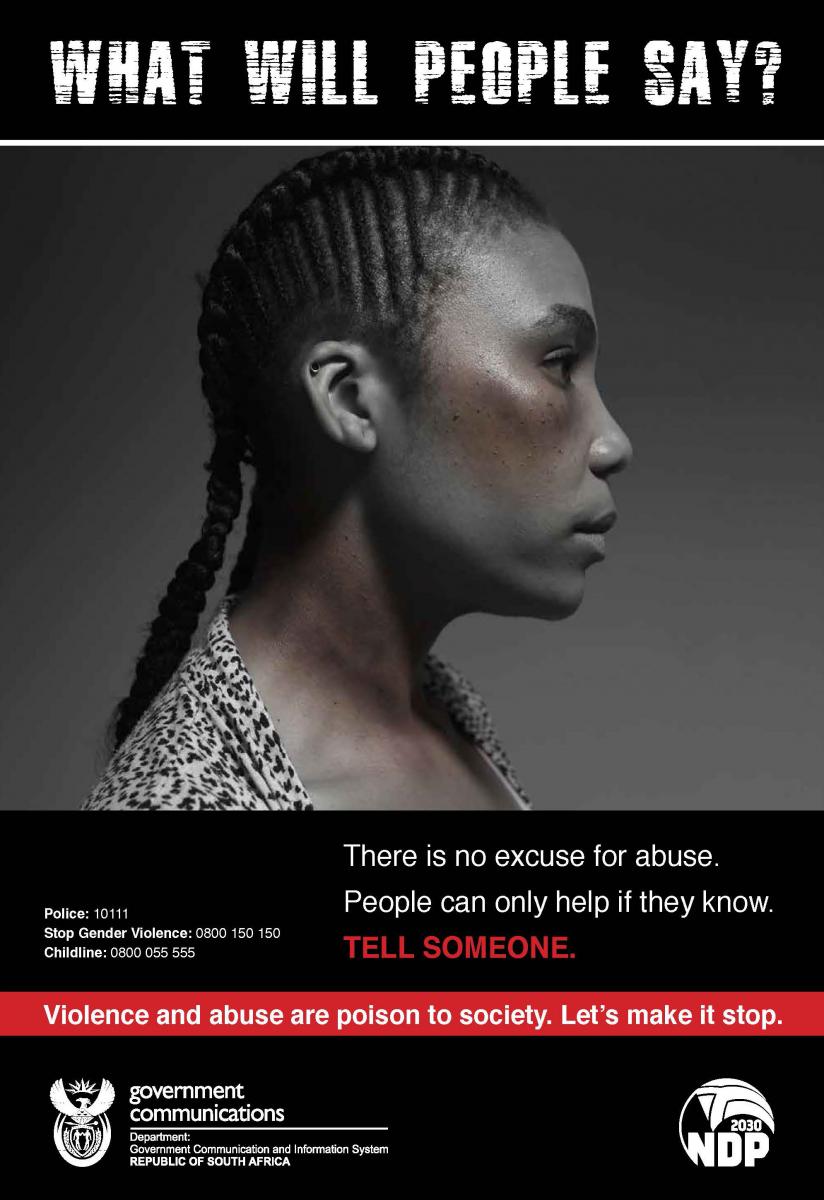
Yes, it is okay for boys to cry
Yes, it is okay for boys to cry UrsulaIf we are to win the fight against Gender-Based Violence (GBV), there needs to be a shift in the way children are raised.
This is the opinion of Israel Sekgale from Child Welfare’s Benoni office. Child Welfare South Africa is a non-profit organisation that advocates for the development of children’s rights in South Africa.
Sekgale said parents must teach boys from the onset that violence is not how problems are sorted out. 
“The world doesn’t need men who can wrestle a buffalo anymore. Instead, boys and men need to be able to communicate,” he said.
Sekgale said one of the ways in which toxic masculinity can be ended is by parents eliminating gender roles in the household. He said in one of his cases, he had to deal with a man who refused to do any domestic chores. This mentality must be tackled at an early age, said Sekgale.
“Parents often treat girls and boys differently. They teach girls to be gentle and obedient, and to consider other people’s feelings. Boys are taught to be assertive, strong and to hide their feelings. Children need to know that both boys and girls can show how they feel, be strong and assertive and solve problems without violence.”
Sekgale said fathers should not just contribute financially but should be participants and active role models in their children’s lives. “They can be nurturing beings from the start, adults who can say: ‘I am not always the boss. I sometimes cry. But I am still strong’.”
Tips for parents:
- Make sure that both boys and girls help at home.
- Encourage both girls and boys to give their opinions.
- Encourage boys and girls to show and talk about all their feelings, even if they want to cry.
- Do not tell your children, ‘Girls do this and boys do that’.
- Apply the same discipline to boys and girls.
- Do not excuse your children’s behaviour by saying, ‘That’s what boys or girls do’.
- Teach boys and girls that they have the right to say no.
- Teach boys and girls to respect each other and that being of one gender does not give rights to manipulate or control others of a different gender.
- Remember that the parent/caretaker of a child is a role-model whose behaviour may be emulated. How to contact Child Welfare South Africa
Website: www.childwelfaresa.org.za,
E-mail: info@childwelfaresa.org.za
Dial: 087 822 1516.
Youngsters have many post-matric opportunities
Youngsters have many post-matric opportunities angenithaMatric students who find themselves without a place to further their studies this year should not despair as there are alternatives out there.
Most matric pupils aspire to study at top higher learning institutions but when January comes around, many are faced with the unknown as they either didn’t qualify or didn’t apply in time.
This does not spell the end of the world, however, as there are options in other areas of study and at other institutions.
According to the Department of Higher Education and Training (DHET), students can pursue a career in many fields that only require a matric pass.
DHET’s Career Development Services (CDS) unit helps students with career guidance and placement applications to higher education institutions. The unit also assists with National Student Financial Aid Scheme funding.
Johana Legodi, an information officer at the department, said students who don’t obtain their desired matric pass marks have the option of rewriting certain subjects, applying for a different course at a different institution or getting a job.
She said pass marks determine where one qualifies to study. Graduating high school learners receive a National Senior Certificate with either a bachelor (previously known as an exemption), diploma or higher certificate pass.
Legodi explained that most universities require a bachelor pass. Students who obtain a diploma pass can go to a university of technology or to a university that offers diploma courses. Learners with higher certificates can go to a technical and vocational education and training (TVET) college.
TVET colleges offer artisan-based courses ranging from beauty therapy to engineering and business management. "Careers in the army and SAPS are also options, as is job shadowing to gain workplace experience," said the Director of CDS, Letshego Mokeki.
DHET’s Central Application Clearing House (CACH) offers a second chance to students who were not accepted in their chosen field or did not apply in time. Mokeki said they can register with CACH, which will share their information with universities that still have space in various fields of study.
“Walk-in applications are not allowed at institutions of higher learning. So the system was developed to help people apply in January,” Mokeki said.
